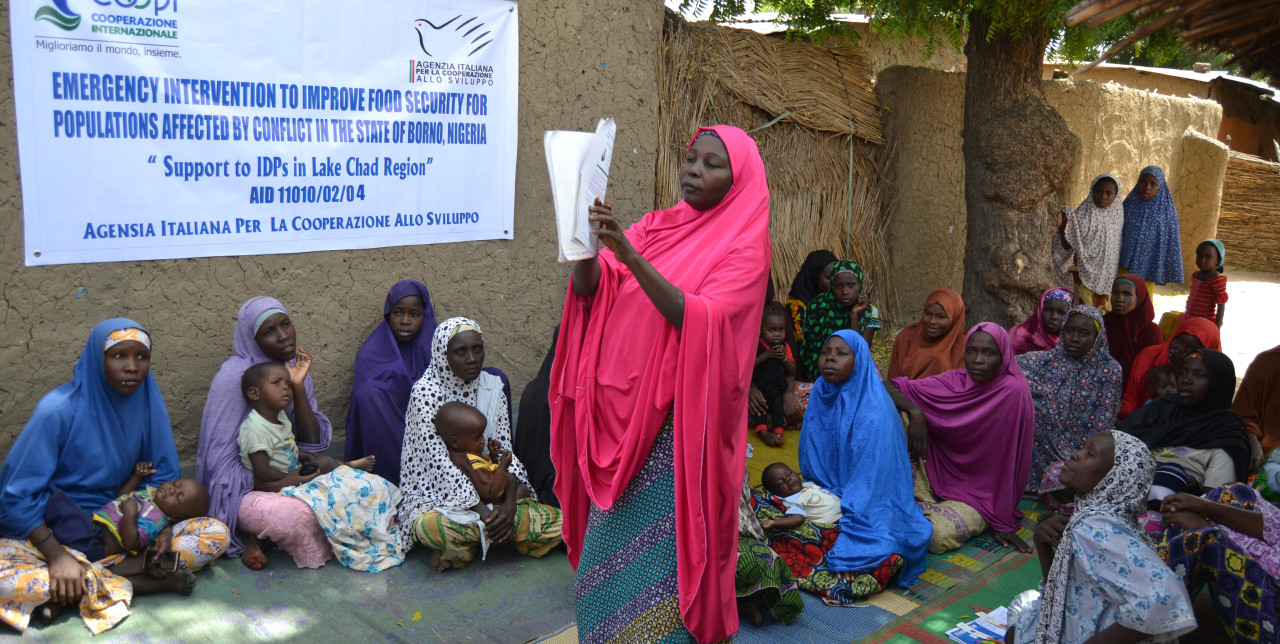04-04-2018 | di COOPI
Food security, hygiene and nutrition in Nigeria
Within the framework of the humanitarian aid program Support to refugees and internally displaced persons in the Lake Chad region , COOPI is carrying out food security and nutrition and hygiene activities in Borno State (Nigeria), owing to the funding of AICS (the Italian Agency for Development Cooperation).
With reference to food security, COOPI identified 700 recipient families among displaced persons, returned migrants and communities hosting residents in Ngmadu. With this intervention, COOPI and AICS have been able to reach a total amount of about 6,000 people, who receive a monthly transfer of3,448 Naira (Nigerian currency), for a total amount of 7 transfers. The transfers are carried out on an electronic card that can be used in 6 shops, which were identified and trained by COOPI at the beginning of the project. The value transferred covers 70% of the daily food requirements (2100 Kcal a day) and covers up to a maximum of 10 members per family. Moreover, the transfers are monitored, owing to the support of COOPI’s staff and the Community Mobilizers. In fact, market analyses, post-distribution controls and focus groups are carried out so as to assess the recipients’ level of satisfaction.
With reference to nutrition and hygiene, up to February, the 700 recipient families received a transfer of 3,000 Naira, which instead in March was equal to 7,500. COOPI is carrying out activities to raise awareness onnutrition practices related to IYCF ( Infant and Young Child Feeding) and on hygiene, in 29 Mother Care Groups (groups of self-mutual aid) composed of 15 mothers each (435 mothers in total), chosen within the community among the pregnant and breastfeeding recipients, who selected autonomously a lead mother for each group. Moreover, at the beginning of the project, COOPI’s personnel and the Community Mobilizers measured the brachial girths on a monthly basis, a measurement then carried out by the mothers. The aim is to identify the cases of moderate-acute or severe-acute malnutrition in the community. With reference to malnutrition, since COOPI is not the direct actor of the program in Ngamdu, it simply refers the cases to the healthcare centre, which then passes them on to other actors. In any case, COOPI’s personnel, the Community Mobilizers and the lead mothers carry out constant monitoring activities on severe-acute malnutrition and moderate-acute malnutrition. The Mobilizers underwent 10 training days, divided into 3 sessions, on the following themes: child nutrition, malnutrition screening, food and personal hygiene best practices, recipients’ monitoring during distribution, support to lead mothers during Mother Care Group meetings.
Moreover, the project enabled to organizeawareness meetings with teachers and students of thethree schools in Ngamdu on nutrition and hygiene best practices. The meetings were to be held in February, but due to security reasons they were postponed to March. COOPI organized 2 meetings per school, divided into 4 sessions (food hygiene, personal hygiene and that of the community, hygiene practices related to hands and oral hygiene). The meetings saw the participation of 800 people between students and teachers. In particular, in order to obtain a greater attention of the children involved (from 6 to 9 years old), a board game was used called “ladder and snake game,” which provided awareness messages on the themes covered during the meeting sessions. The game was made of a series of obstacles or “bonuses”: the former provided messages on wrong hygiene practices, while the latter contained messages related to good food and personal hygiene practices.




 Nigeria
Nigeria